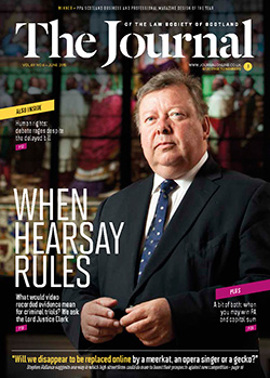Opinion: Thomas Ross

In May 2013, Lord Carloway, in a call for “clear-sky thinking”, claimed that certain Scottish criminal trial procedures were “rooted in the Victorian era”, an assertion that I do not feel tempted to dispute. The Evidence and Procedure Review Report tentatively suggests ways in which procedures for taking evidence could be brought into the 21st century. I do not agree with every suggestion made, but I do congratulate Lord Carloway for opening up debate on the issue.
The report wrestles with two competing considerations, namely that evidence should be taken in a way that (a) minimises inconvenience to the witness, and (b) gives the accused a fair opportunity to test its accuracy.
The part of the report that drew most attention from the profession raises the possibility of interference with the right to cross-examine witnesses. I look at two parts of the report in this connection.
First, the Barnehus. The report considers ways in which other jurisdictions deal with child witnesses. The most creative example given is Norway (para 2.48). There, a child making an allegation of sexual or violent conduct is taken to a Barnehus, where he/she is questioned by a police officer in the presence of a judge, counsel for the complainer, counsel for the prosecution and a defence lawyer (along with other individuals with a welfare function). The defence lawyer has no right to question the child, although they can make suggestions to the interviewer.
Of course, at that early stage there may not be an “accused”, with the result that the “defence lawyer” will not have a client to inform them as to lines of enquiry that should be put to the witness for comment. In these circumstances, one is bound to observe that the defence lawyer would be “taking blind shots at a hidden target” (to quote Lord Hewart in Coles v Odhams Press Ltd [1936] 1 KB 416). In a case where the accused wished to put a number of positive assertions to the child, it is almost impossible to see how adoption of this procedure could allow a fair trial.
The report (para 2.53) sees it differently: “It is notable that, given that this hearing takes place a short time after the incident is reported, there may not even be an identified defendant who has been charged. In this case, a lawyer is appointed to represent the defence’s interests in anticipation of future proceedings. Under the current jurisprudence of the European Court, this appears to be compliant with the Convention.”
Secondly, the report raises the possibility that the absolute right to cross-examine might be interfered with. It makes the perfectly sensible suggestion that a party seeking to rely on a digitally recorded prior statement could apply to the court to use that statement as “evidence in chief”. One can easily think of many situations where such a procedure could be adopted without disadvantage to anybody, provided the accused had the right to cross-examine the witness.
That is not the proposal. Instead, it is suggested (para 4.14) that the accused could apply for authority to exercise their right to cross-examine, whereupon the court may authorise cross-examination and would have the right to limit its extent both in relation to subject matter and duration (my emphasis).
The report goes on to narrate the recent history of “judicial case management”, referring to the Bonomy reforms that led to the introduction of preliminary hearings. Continuing on this theme, “this judicial control will, in the case of the new approach to criminal procedures, need to extend to the management of the cross-examination process… it is quite consistent with the concept of a fair trial, and the concomitant rights under the Convention, that questioning should be contained within reasonable limits. The challenge will be for the judges… to have the confidence to impose those reasonable limits and ensure that the parties adhere to them” (para 4.22).
In Al Rawi v The Security Service [2012] 1 AC 531, Lord Dyson JSC stated that: “Another feature of the principle of natural justice is that the parties should be given an opportunity to… cross-examine the opposing witnesses. As was said by the High Court of Australia in Lee v The Queen [(1998) 195 CLR 594 at para 32], confrontation and the opportunity for cross-examination is of central significance to the common law adversarial system of trial.”
The Scottish Criminal Bar Association agrees, and enters the discussion process with a mind that is open to “clear-sky thinking”, but closed to the possibility of the removal of the right to cross-examine.
In this issue
- Weighing the risks
- Private parking fines – are they enforceable?
- Scotland – home of (dangerous) golf
- Shareholder details: the right to refuse
- Perils of the owner-occupied croft (fuller version)
- Reading for pleasure
- Opinion: Thomas Ross
- Book reviews
- Profile
- President's column
- Land Register completion: one year in
- People on the move
- Rights: whose final say?
- The word on the street
- Screen test
- Making the best of mediation
- Keep up the payments
- The right priorities
- When reputation is not enough…
- Sports justice – being seen to be done?
- Source of disputes
- CML Handbook: the new deal
- Perils of the owner-occupied croft
- In-house and in-tune in the Commonwealth
- Stair Society seeks new blood
- New Build Standard Clauses revised
- Law reform roundup
- Leven's last hole rarely in benevolent mood
- Year of the new look
- AML just became simpler
- "My time is valuable!" Oh really?
- Learning opportunity
- Ask Ash
- Technology: slave or master?






